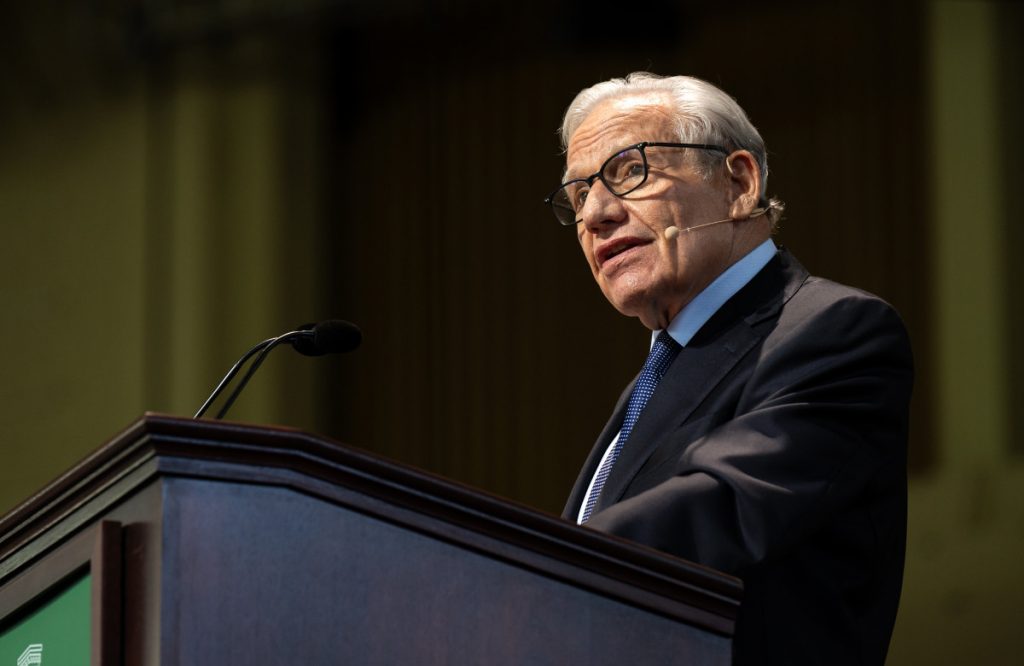
Alton Northup
Staff writer
When Bob Woodward gets a phone call, it could be his daughter, a telemarketer, a friend or the president of the United States.
On Sept. 8, 1974, it was his reporting partner Carl Bernstein: “The son of a bitch pardoned the son of a bitch.”
Woodward registered immediately what Bernstein was referring to; after only 30 days in office, President Gerald Ford had granted a full and unconditional pardon to his predecessor, Richard Nixon.
Along with other journalists, Woodward blamed Ford’s loss in the 1976 election on that pardon. However, he could not understand why Ford granted it if he knew it could cost him the election.
“I remember thinking, ‘It’s the final corruption of Watergate,’” Woodward said.
One of the most renowned journalists in the country, he discussed his storied career as an investigative journalist with The Washington Post, including the aftermath of his and Bernstein’s investigation into the 1972 break-in of the Democratic National Committee headquarters in Washington, D.C. at the Watergate Complex. Woodward delivered his remarks then spoke in conversation with Deborah Sunya Moore, senior vice president and chief program officer, at 10:45 a.m. Thursday in the Amphitheater in the penultimate lecture of the Chautauqua Lecture Series Week Eight theme, “Freedom of Expression, Imagination, and the Resilience of Democracy.”
In 1998, Woodward was speaking with Ford at his California home. The two had six previous interviews that year, but as they reached their final meeting, he wanted to ask a question more than two decades in the making.
“Why did you pardon Nixon?” he asked Ford.
As controversial as the decision was, Ford had yet to reveal his reasoning behind the pardon. Many, including Woodward, speculated the two presidents had cut some sort of deal. He sat quietly so as to “let the silence suck out the truth,” as they say in the CIA, waiting for Ford’s response.
“He said, ‘Let me tell you what happened,’ ” Woodward recalled. “ ‘All of a sudden I was president, I’d been president for 30 days, and prior to becoming president I’d been Gerry Ford, politician, always thinking about what’s in my political interest. All of a sudden, I’m up here and I’m looking down on the country and I have a different role; I have to ask what’s not good for Gerald Ford, but what’s good for the country.’ ”

Nixon dominated the headlines in the weeks following his resignation, despite his wish that he no longer serve as a distraction to the country. Papers speculated what cabinet members might follow his exit, questioned the fate of his tapes and if he would face criminal charges. Ford, Woodward said, realized the country needed to move on.
“Ford said, in this plaintive voice, ‘I needed my own presidency,’ ” he said. “ ‘I had to get Nixon off the front page and out of the news, into the history books.’ ”
Woodward said Ford knew he would suffer the consequences of the pardon, but felt it was in the nation’s best interest to move on.
“I was sure it was corruption,” Woodward said. “Instead of being corrupt, it was courage. You can’t be in my business and not ask the question: What else don’t I understand? What else did I get wrong?”
In his farewell speech to White House staff, Nixon spent little time on what he got wrong. Woodward described the address as the president “airing out grievances.”
“Always remember, others may hate you, but those who hate you don’t win unless you hate them, and then you destroy yourself,” Nixon said to his staff.
Woodward finds wisdom in those words from a man who failed to heed his own advice and personally suffered the consequences.
“Hate was the poison driving him and his administration and his realization (was) that it didn’t destroy the enemies but destroyed him,” he said. “Political hate is so strong.”
Nearly 50 years later, the corrosive power of political hatred remains strong. During 2019 and 2020, just after President Donald Trump’s first impeachment, the former president made a series of calls to the Woodward residence.
Persuaded by U.S. Sen. Lindsey Graham (R-SC), Trump allowed Woodward to record more than six hours of their conversations. One moment particularly stands out for Woodward as defining the former president’s character.
He recalled sitting in a White House office as Dan Scavino, White House deputy chief of staff for communications, played Trump’s State of the Union address, though it was edited with “hyped-up elevator music” and panned to the faces of Senators Bernie Sanders, Elizabeth Warren and Kamala Harris.
Woodward said the three looked passive as they watched his address, but Trump stood behind him commenting “Hate, see the hate?” each time they appeared on the screen.
“Trump infected himself with the hate and anger we see in our politics today,” Woodward said.

As Trump faces an onslaught of indictments for his alleged effort to overturn the 2020 election, Woodward does not share the concern of others that Trump poses a threat to democracy. He noted that despite the former president’s crusade, Joe Biden still took office on Jan. 20, 2021.
However, he said Trump has created a national atmosphere of mistrust. Recent headlines raving about Florida Gov. Ron DeSantis’ admission that Trump lost the election demonstrates the former president’s ability to control the narrative.
Woodward said he hopes special counsel Jack Smith’s investigation into Trump will vindicate the fact-finding process that made Watergate possible.
“We talk, interestingly enough, about (how) we live in a post-truth era – we don’t,” he said. “Read that indictment; it is fact after fact. When I read it, I thought it’s the four pillars of journalism: Witnesses, participants, contemporaneous notes … and documentation.”
Woodward and Bernstein’s Watergate investigation is synonymous with those four pillars; the University of Texas purchased 75 boxes of notes from the reporters for $5 million in 2003 to preserve them. This attention to detail has gained Woodward trust from some of the nation’s highest-ranking officials.
In 1979, Woodward co-authored The Brethren: Inside the Supreme Court, with journalist Scott Armstrong. The book gives a behind-the-scenes account of one of the nation’s most important, but secretive, institutions.
Written with Woodward’s trademark use of off-the-record sources, in which a source’s information or name cannot be used for publication, Associate Justice Potter Stewart was not revealed as the primary source for the book until his death in 1985.
After the book was published, Woodward ran into Stewart at the Kennedy Center and asked for his review.
“He looked at me and he said, ‘There’s a lot of truth in that book. Too much truth,’” Woodward said. “And so I think of that question, can we have too much truth? Not about the Supreme Court.”
In the decades since Watergate, many people have asked Woodward why he chose to pursue the story. His answer: It is the job of a journalist to point out what is not working.
He criticized the current state of news in the country, characterizing it as political and full of big personalities.
After Nixon resigned, The Washington Post publisher Katharine Graham left a scribbled note on Woodward and Bernstein’s desk.
“Now don’t start thinking too highly of yourselves,” Woodward recalled the contents of the letter. “Beware the demon pomposity.”




